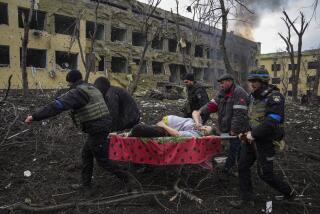Review: For his return to the movies he chose ‘State Funeral,’ one that has everything
Recently, I went to my first movie in a theater in 14 months. As the opportunity to patronize cinemas in person again presented itself to this vaccinated cinephile — we’re the ones who see the light of a pandemic’s end as the chance to go back into the dark — I hadn’t really considered what movie would constitute my own return engagement.To mark that absence with the right choice started to feel like something that should be carefully considered.
Did I want something classic or new? Nonfiction or fantasy? Overblown and insipid, or human-sized and emotional? Weird and disorienting, or focused on craft and detail? Star-driven, or anchored by unknowns? A product of a system or the work of an independent voice? Something personal, or political?
One movie, it turned out, had it all: “State Funeral.”
Using extraordinary found footage — color and black-and-white — from 200 Soviet cameramen capturing the aftermath of Josef Stalin’s death in 1953, Ukrainian director Sergei Loznitsa’s clinical and fascinating 135-minute assembly of this priceless archive is a categorically weird, thrillingly immersive distillation of four days of official, cultish pomp and mourning for one of the 20th century’s biggest monsters. Industry stopped. Millions came to Moscow. One leader’s death cast a pall over everything.
To be dropped, time machine-style, into a world power’s solemn closing of a grim chapter was, on one level, a theme-adjacent choice of movie, for sure. But it was never going to be some proxy for delayed pandemic grief — this was a funeral for a dictator whose evils across decades can seem uncountable. (Death toll estimates range, but they’re always in the many millions.) Settling into my seat, I assumed I’d be caught up in the arch theatricality of it all as some crazy, beyond-my-grasp distraction.
Loznitsa doesn’t provide context, in any case. He wants you to experience this restored record as an in-the-moment reality, nation-sized and yet up close — the final achievement of a tyrant. We hear the tragedy-pitched, medically detailed announcements of his death from loudspeakers across the Soviet Union. We see people lined up at kiosks to read the news. Dignitaries from USSR-friendly nations arrive at the airport. An endless procession of people file through Pillar Hall in the House of the Unions to view Comrade Stalin’s displayed body, after which the funeral marches toward the Mausoleum in Red Square for the interment, and the Politburo leadership give lionizing eulogies to the freezing masses. The number of huge wreaths — heavy enough to require many carriers — and floral arrangements is mind-boggling.
But as I took it in, I realized what this mesmerizing display was what I needed after a year marked by death, disinformation and demagoguery: an anti-catharsis, history made palpable, a record of what some leaders still crave. In the loony seriousness of it all, “State Funeral” isn’t spectator sport — it makes us active observers of a scary machinery, something to file away. (Armando Iannucci fed our taste for more pointed absurdism, anyway, with his fantastically comedic version of the behind-the-scenes infighting at that time, “The Death of Stalin”).
Mostly, I found myself awed by the sheer number of faces we get to see parading past his coffin — workers, military, functionaries. Who was performing? Who believed? I was driven to scrutinize each one for some kernel of truth. Is that woman crying for the future of her country? Was that stricken-looking soldier newly terrified, or just sad? Was that blank-faced man somebody too hollowed out to care? Or nervous?
After seeing “State Funeral,” I was mysteriously woozy the rest of the day, as if I’d been drugged. But my jolted equilibrium also seemed a fitting physiological reaction after so bizarre a march of grief, power and numbing spectacle, and following a year when we’ve all had to learn how to manage devastation. Maybe Loznitsa would find that the best response to his patient supercut of authoritarian pageantry.
'State Funeral'
In Russian with English subtitles
Not rated
Running time: 2 hours, 15 minutes
Playing: Available on the streaming service Mubi
More to Read
Only good movies
Get the Indie Focus newsletter, Mark Olsen's weekly guide to the world of cinema.
You may occasionally receive promotional content from the Los Angeles Times.










